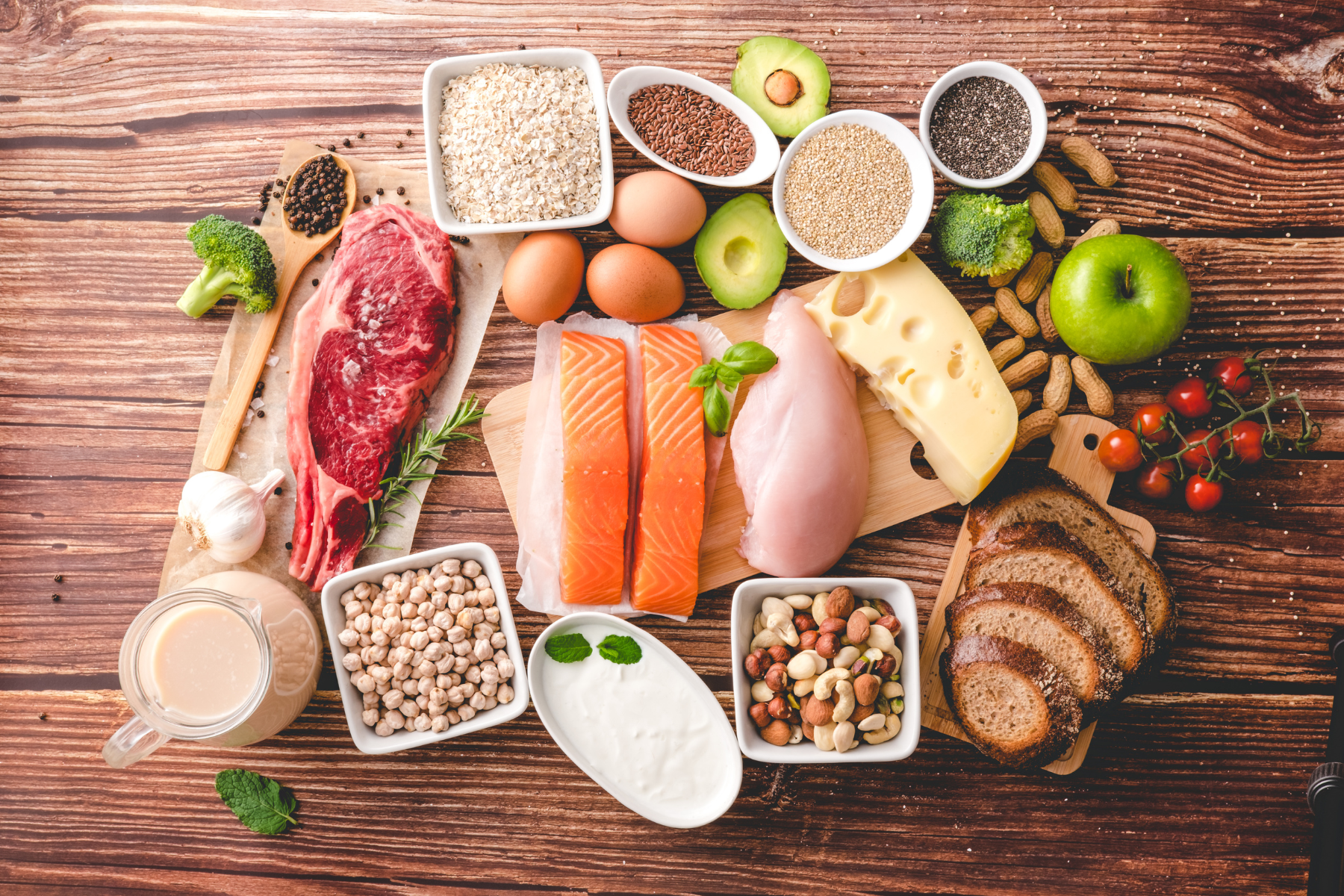
A Comprehensive Menopause Food Plan To Help You Navigate The Change
Welcome to a significant phase in every woman's life—menopause. As your body undergoes various changes, managing the associated symptoms becomes crucial. One fantastic way to cruise through this journey is with a well-thought-out menopause food plan. Let's dive into the delicious details of embracing this transition with the right foods!

Hormonal Changes and Metabolism
Embarking on menopause is a transformative journey for every woman, and understanding the profound changes occurring within the body is crucial. The drop in estrogen levels during menopause has far-reaching effects that significantly impact a woman's health.
These changes include a slowdown in metabolism, which can make it easier to gain weight. This shift emphasizes the importance of adopting a diet that supports metabolic health and weight management.
Furthermore, the decline in bone density during menopause raises concerns about an increased risk of bone fractures. Ensuring an adequate intake of calcium and vitamin D-rich foods becomes imperative to safeguard bone health.
In addition to metabolic and bone-related changes, menopausal symptoms such as hot flashes, insomnia, and others can significantly interfere with a woman's quality of life. These symptoms, both physical and emotional, underscore the need for a holistic approach to well-being, encompassing both lifestyle and dietary adjustments. In this guide, we outline some ways that adjusting your diet can support your body during this transition.
Building Your Foundation: What Are The Key Nutrients In A Menopause Food Plan?
The following nutrients play a vital role during menopause, so it's crucial to pay special attention to incorporating them into your meal planning.
- Calcium and Vitamin D for Bone Health:
- Declining estrogen levels can affect bone density. Ensure an adequate intake of dairy, leafy greens, and fortified foods.
- Omega-3 Fatty Acids for Heart Health
- Protect your heart by incorporating fatty fish, flaxseeds, chia seeds, and walnuts into your meals.
- Phytoestrogens for Hormonal Balance
- Phytoestrogen-rich foods like soy products, legumes, and whole grains mimic estrogen, helping balance hormonal shifts.

Eating With Intention: Which Foods You Should Include in Your Menopause Food Plan
Dairy Products:
Low-fat or Greek Yogurt:
- Calcium for Bone Health: Yogurt is a rich source of calcium, essential for maintaining bone density, especially important during menopause when the risk of osteoporosis increases.
- Probiotics for Gut Health: The probiotics in yogurt support a healthy gut microbiome, which can positively impact digestion and overall well-being.
- Protein Content: Greek yogurt is a high-protein option, aiding in muscle maintenance and promoting a feeling of fullness.
Milk (Cow's or Fortified Plant-Based):
- Calcium and Vitamin D: Milk provides a combination of calcium and vitamin D, crucial for bone health. Choosing fortified plant-based milk is suitable for those with lactose intolerance or following a plant-based diet.
- Low-Fat Options: Opting for low-fat or skim milk helps manage saturated fat intake, promoting heart health.
Cheese:
- Calcium and Protein: Cheese is a convenient source of both calcium and protein, supporting bone health and muscle maintenance.
- Choose Wisely: Opting for low-fat or reduced-fat cheese varieties helps balance calcium intake with saturated fat levels.
Kefir:
- Probiotics and Calcium: Kefir is a fermented dairy product containing probiotics, contributing to gut health. It also provides calcium for bone health.
Cottage Cheese:
- Protein and Calcium: Cottage cheese is a protein-rich option with a good amount of calcium. Its lower fat content makes it a sensible choice for those mindful of their fat intake.
Leafy Greens (in addition to the previously mentioned leafy greens):
Kale:
- Nutrient Powerhouse: Kale is rich in vitamins A, C, and K, as well as calcium and fiber. This nutrient density supports bone health and overall well-being during menopause.
Spinach:
- Bone Health and Iron: High in iron, calcium, and magnesium, spinach contributes to bone health and helps prevent anemia, which can be a concern during menopause.
Collard Greens:
- Calcium, Folate, and Fiber: Collard greens provide calcium, folate, and fiber, supporting bone health and aiding in weight management during menopause.
Swiss Chard:
- Vitamins and Minerals: Packed with vitamins A and K, magnesium, and iron, Swiss chard is a nutritious leafy green that supports bone health and may help alleviate fatigue during menopause.
2. Omega-3 Fatty Acid Sources
Fatty Fish (Salmon, Mackerel, Sardines):
- Heart Health: Omega-3 fatty acids found in fatty fish are known to support cardiovascular health, reducing the risk of heart disease – an important consideration during menopause when the risk of heart-related issues may increase.
- Brain Function: These fatty acids are also associated with cognitive function, potentially helping to alleviate cognitive symptoms that some women may experience during menopause.
Flaxseeds and Chia Seeds:
- Hormonal Balance: Flaxseeds and chia seeds are rich in alpha-linolenic acid (ALA), a type of omega-3 fatty acid. ALA may contribute to hormonal balance, which is particularly relevant during menopause when hormonal fluctuations can lead to various symptoms.
- Digestive Health: The high fiber content in these seeds can aid in digestion, which is beneficial as digestive issues may become more prevalent during menopause.
Walnuts:
- Anti-Inflammatory: Walnuts contain omega-3 fatty acids, which possess anti-inflammatory properties. This can be advantageous during menopause as inflammation is often associated with symptoms such as joint pain and hot flashes.
- Mood Support: Omega-3s in walnuts may also have a positive impact on mood, potentially helping to manage mood swings and symptoms of depression or anxiety that can occur during menopause.
3. Phytoestrogen-Rich Foods
Soy Products (Tofu, Tempeh, Edamame):
- Hormonal Balance: Soy products contain phytoestrogens, plant compounds that mimic the effects of estrogen in the body. During menopause, when estrogen levels decline, incorporating soy can help balance hormonal fluctuations, potentially alleviating some menopausal symptoms such as hot flashes and mood swings.
- Bone Health: Soy isoflavones, a type of phytoestrogen in soy products, may contribute to bone health by helping to maintain bone density. This is crucial as menopausal women are at an increased risk of osteoporosis.
b. Legumes (Beans, Lentils, Chickpeas):
- Protein and Nutrient Dense: Legumes are excellent sources of plant-based protein, providing essential amino acids necessary for muscle health and overall well-being. Ensuring an adequate protein intake is important during menopause to support muscle mass and metabolism.
- Fiber Content: Legumes are rich in dietary fiber, aiding in digestion and promoting a feeling of fullness. This can be particularly helpful for managing weight, which may be a concern during menopause.
c. Whole Grains (Quinoa, Brown Rice, Oats):
- Stable Energy: Whole grains provide complex carbohydrates, offering a steady release of energy throughout the day. This can help combat fatigue and support overall energy levels, which might be affected during menopause.
- Nutrient Diversity: Whole grains are rich in vitamins, minerals, and antioxidants, contributing to overall nutritional needs. This diversity is essential during menopause, as the body may require additional nutrients to support various physiological functions.
- Digestive Health: The fiber in whole grains supports digestive health, preventing constipation and promoting regular bowel movements, which can be important during hormonal changes.
Foods to Avoid During Menopause
Caffeine and Hot Flashes
Limit caffeine intake to reduce the frequency and intensity of hot flashes.
High-Sugar and Processed Foods
Opt for natural sugars from fruits and avoid processed snacks.
Excessive Alcohol Consumption
Moderate alcohol intake, as excessive alcohol can exacerbate menopausal symptoms.
Sample Menopause Meal Plan
Now that we’ve covered some of the essential nutrients you should be incorporating into your diet, let's take a look at a sample menopause meal plan.
Breakfast Options:
1. Greek Yogurt Parfait:
-
Ingredients:
- Low-fat or Greek Yogurt
- Fresh Berries
- Chia Seeds
- Almonds or Walnuts (for omega-3 fatty acids)
- Nut Butter
How to make it:
Start by layering a bowl or glass with a generous serving of low-fat or Greek yogurt and a dollop of your favorite nut butter. Add a handful of fresh berries on top for a burst of antioxidants and natural sweetness. Sprinkle chia seeds for added fiber and omega-3 fatty acids. Lastly, garnish with a handful of almonds or walnuts to support brain development in the baby. Mix and enjoy!
2. Spinach and Feta Omelette:
-
Ingredients:
- Eggs
- Spinach
- Feta Cheese (low-fat)
- Leafy greens on the side (e.g., kale or Swiss chard)
How to make it:
Whisk eggs in a bowl and fold in fresh spinach leaves. Heat a non-stick pan and pour the egg and spinach mixture. Once the edges set, crumble low-fat feta cheese over one half of the omelette. Fold the other half over the cheese and let it cook until the cheese melts. Serve with a side of leafy greens like kale or Swiss chard for an extra boost of iron and vitamins.
3. Flaxseed Smoothie:
-
Ingredients:
- Fortified Plant-Based Milk
- Flaxseeds
- Banana
- Kale or Spinach
- Greek Yogurt
How to make it:
Combine fortified plant-based milk, a ripe banana, a handful of kale or spinach, a spoonful of flaxseeds, and a dollop of Greek yogurt in a blender. Blend until smooth and creamy.
Lunchtime Delights:
1: Salmon Salad
- Grilled Salmon (rich in omega-3 fatty acids)
- Mixed Greens (e.g., kale, spinach)
- Cherry Tomatoes
- Quinoa
- Feta Cheese (providing calcium)
How to make it:
Craft a nutritious Salmon Salad by combining grilled salmon, mixed greens like kale and spinach, cherry tomatoes, and quinoa. Top it off with crumbled feta cheese for added calcium. This salad not only offers a delicious medley of flavors but also delivers essential nutrients to support overall health, including omega-3 fatty acids and calcium.
2: Tofu Stir-Fry
- Tofu (a source of soy protein)
- Edamame
- Broccoli
- Brown Rice
- Sesame Oil (providing healthy fats)
How to make it:
Whip up a Tofu Stir-Fry featuring tofu for plant-based protein, edamame, broccoli, and brown rice. Cooked in sesame oil, this stir-fry not only satisfies hunger but also provides a nutrient-packed, well-balanced meal. The combination of tofu and edamame ensures a protein boost, while broccoli adds vitamins and fiber. You can also top it with sesame seeds for added nutrients.
3: Mackerel Wrap
- Whole Grain Wrap
- Mackerel (packed with omega-3 fatty acids)
- Leafy Greens (e.g., collard greens)
- Greek Yogurt Sauce
How to make it:
Prepare a Mackerel Wrap by filling a whole grain wrap with mackerel, a rich source of omega-3 fatty acids, and leafy greens like collard greens for added vitamins. Drizzle with a flavorful Greek yogurt sauce to enhance the taste and texture. This wrap not only serves as a tasty meal but also delivers essential nutrients to support heart health and overall well-being.
Dinner Inspiration
1: Chicken and Collard Greens Stir-Fry
- Chicken Breast
- Collard Greens
- Bell Peppers
- Quinoa
- Olive Oil (for healthy fats)
How to make it:
Create a flavorful Chicken and Collard Greens Stir-Fry by sautéing chicken breast, collard greens, and bell peppers in olive oil. Serve it over quinoa for a wholesome and satisfying meal. This stir-fry combines lean protein, leafy greens, and whole grains, offering a well-rounded dish with a perfect blend of flavors and nutrients.
2: Vegetarian Lentil Soup
- Lentils (plant-based protein)
- Spinach
- Carrots
- Tomatoes
- Cottage Cheese (for calcium)
How to make it:
Warm up with a nourishing Vegetarian Lentil Soup that features protein-packed lentils, vibrant spinach, carrots, and tomatoes. To enhance creaminess and calcium content, add a dollop of cottage cheese. This comforting soup not only provides essential nutrients but also offers a hearty and filling option for a wholesome meal.
3: Baked Tempeh with Swiss Chard
- Tempeh (phytoestrogen-rich)
- Swiss Chard
- Sweet Potatoes
- Olive Oil (for healthy fats)
How to make it:
Prepare a phytoestrogen-rich Baked Tempeh with Swiss Chard by marinating tempeh and baking it alongside Swiss chard and sweet potatoes. Drizzle with olive oil for added healthy fats. This dish not only introduces phytoestrogens to the diet but also combines textures and flavors for a satisfying and nutritious experience.
Healthy Snacks During Menopause
As menopausal symptoms may strike at any time, having healthy snacks on hand is crucial. Consider these nutritious options:
- Nuts and Seeds Mix: Almonds, walnuts, and pumpkin seeds make for a convenient and nutrient-packed snack.
- Greek Yogurt with Berries: A quick and tasty snack that's high in protein and rich in antioxidants.
- Dark Chocolate and Almond Clusters: Indulge in a mix of dark chocolate and almonds for a satisfying sweet treat with added health benefits.
- Fresh Fruit Slices with Cheese: Pair apple or pear slices with a small serving of low-fat cheese for a balanced and tasty snack.
- Veggies and Guacamole: Dip carrot and cucumber sticks into guacamole for a delicious and satisfying snack rich in healthy fats.
- Chia seed pudding: Mix chia seeds with milk or a dairy-free alternative, add a sweetener like honey or maple syrup, and let it sit until it forms a pudding-like consistency. Top with berries or nuts for added flavor, or check out these 3 delicious chia pudding recipes.
The Importance of Staying Hydrated
Hydration plays a pivotal role in supporting overall well-being during menopause. As hormonal changes occur, women may experience symptoms such as hot flashes and night sweats, which can contribute to increased fluid loss. Adequate hydration becomes crucial in mitigating these effects and maintaining optimal bodily functions. Staying well-hydrated can help alleviate common menopausal symptoms, including fatigue, irritability, and difficulty concentrating.
Therefore, adopting a mindful approach to staying well-hydrated is crucial during menopause, enabling women to navigate this life stage with enhanced comfort and vitality. Some of our favorite ways to hydrate include incorporating herbal teas, infused water with fresh fruits, and consuming hydrating fruits and vegetables like cucumber and watermelon.

Lifestyle Tips for Managing Menopausal Symptoms
It’s no doubt that navigating the menopausal transition can be challenging, but adopting a proactive approach to lifestyle choices can significantly alleviate symptoms and enhance overall well-being. In this context, incorporating the following key lifestyle tips can become pivotal in managing your symptoms and leave you feeling more empowered and in control of your well-being.
Regular exercise, beyond its physical benefits, becomes a cornerstone in boosting your mood, managing weight, and supporting holistic health. Stress management techniques, including yoga, meditation, or deep breathing exercises, emerge as powerful tools to diminish stress levels and promote emotional balance. Prioritizing a good night's sleep is essential, contributing not only to overall well-being but also ensuring sustained energy levels for the challenges of daily life. By embracing these lifestyle strategies, you can navigate the complexities of menopausal symptoms with greater resilience and emerge with a heightened sense of vitality and empowerment.
The Role of a Nutritionist
We recommend that you consider consulting a nutritionist or dietitian to create a personalized menopause food plan. They can tailor recommendations based on your health, preferences, and any dietary restrictions, making your journey smoother.
Wrapping Up
Incorporating a menopause-friendly diet is a powerful step towards managing symptoms and promoting overall health. Embrace these dietary changes, stay active, manage stress, and prioritize self-care to navigate menopause with confidence and vitality. Remember, your journey is unique, and consulting a professional can provide personalized support for a smoother transition. Cheers to a healthy and vibrant menopausal phase!
Unlock Exclusive Deals!
Be the first to know about our special promotions, new arrivals, and more when you sign up for our newsletter.



